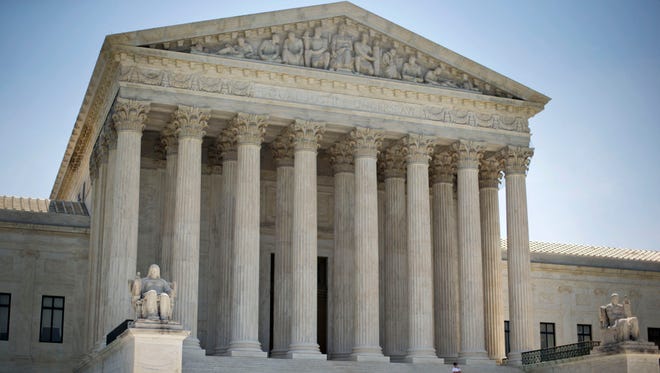High court forced to deal with voting, redistricting

WASHINGTON — Supreme Court justices like to think they are above politics, but their 2014 docket is becoming littered with cases that could benefit Democrats or Republicans.
The court agreed Thursday to decide whether state legislatures can be removed from the process of drawing congressional lines, as was done by voter initiative in Arizona. Republicans there want that power back.
Already scheduled for oral argument in November is another case in which Democrats and black state legislators in Alabama claim the GOP-controlled Legislature drew district lines that intentionally packed African Americans into some districts, so others would be more accommodating to Republicans.
Both of those cases came to the court on direct appeal, rather than through the normal petition process — meaning the justices had little choice but to get involved.
As November's election approaches, the court is being inundated with requests from Ohio, Wisconsin and North Carolina to intercede in disputes involving how easy or difficult it will be to cast ballots:
•The justices voted 5-4 on Monday to block the start of early voting in Ohio. The court's conservatives sided with the state, which had decided this year to reduce the number of early voting days, along with some evening and Sunday hours.
•The American Civil Liberties Union asked the justices Thursday to block Wisconsin's new photo ID law from going into effect for this election. A federal district judge struck down the law as unconstitutional in April, but an appellate court ruled last month that it could go into effect while the state is appealing.
•North Carolina asked the justices Thursday to block the previous day's federal appeals court ruling that tossed out key parts of its new law on voting procedures. The ruling would restore same-day registration and allow votes cast in the wrong precincts to be counted.
Though the various disputes involve procedural issues — and, in at least one case, race — they exist for the same reasons: to benefit one party or the other in future elections. For that reason, the justices serve as reluctant umpires.
The latest case accepted by the court affects only Arizona, but 13 states use commissions to draw political district lines. Eight have backup or advisory commissions to assist lawmakers.
The commissions are intended to take at least some of the partisanship out of the line-drawing that follows each decade's Census. When legislatures controlled by one party draw the lines, they inevitably create districts much more favorable to their candidates.
Arizona voters created the commission in 2000. Republican lawmakers filed their lawsuit after the latest round of line-drawing produced districts for 2012 that resulted in the election of five Democrats and four Republicans. The GOP has a slight statewide edge in voter registration.